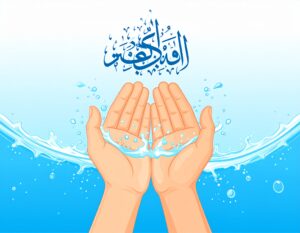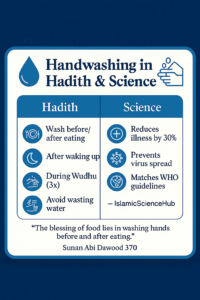🧼 The Scientific Wisdom Behind Handwashing in Hadiths
More than 1400 years ago, Prophet Muhammad ﷺ provided guidance on personal hygiene that still resonates today — not only spiritually but scientifically. Among the most emphasized practices was handwashing, now globally recognized as one of the most effective means of infection control. This article explores the depth of hadiths on hand hygiene, the insights of classical scholars, and how modern science confirms their profound truth.
📜 Prophetic Teachings on Handwashing in Hadiths
Islamic tradition places extraordinary value on cleanliness. Prophet Muhammad ﷺ repeatedly emphasized the importance of washing hands at key times — actions now validated by microbiological research .
.
1. Before and After Eating
“The blessing of food is in washing the hands before and after eating.”
— Sunan Abi Dawood 3760
Arabic: البركة في الطعام الوضوء قبله والوضوء بعده
Imam Al-Nawawi stated in his commentary on this hadith that handwashing is part of Islamic etiquette (Adab) and promotes both physical purity and spiritual humility before partaking in sustenance.
2. After Waking Up
“When one of you wakes up from sleep, he should not put his hand into a utensil until he washes it three times…”
— Sahih al-Bukhari 162
Arabic: إِذَا اسْتَيْقَظَ أَحَدُكُمْ مِنْ نَوْمِهِ، فَلَا يَغْمِسْ يَدَهُ فِي الإِنَاءِ حَتَّى يَغْسِلَهَا ثَلَاثًا
Ibn Hajar al-Asqalani commented that this ruling is partly due to the unseen — one may unknowingly touch impurities during sleep — highlighting the Prophet’s foresight in unseen hygiene risks, akin to modern germ theory.
3. Cleanliness is Half of Faith
“Cleanliness is half of faith.”
— Sahih Muslim 223
Arabic: الطُّهُورُ شَطْرُ الإِيمَانِ
Imam Al-Ghazali in his *Ihya Ulum al-Din* wrote that physical purity is a reflection of one’s inward purity, making acts like handwashing a form of worship when done with correct intention.
4. Avoiding Waste While Washing
“Do not waste water, even if you are by a flowing river.”
— Sunan Ibn Majah 425
Arabic: لا تسرف في الماء ولو كنت على نهر جارٍ
💧 How to Save Water in Handwashing
Islam teaches balance in all acts — including cleanliness. Both Prophetic Sunnah and scientific studies promote conserving water while maintaining hygiene. Here’s how you can practice mindful handwashing:
The Prophet ﷺ performed ablution with just a mudd (approx. 650 ml)
“Do not waste water, even if you are by a flowing river” — Sunan Ibn Majah 425
Close the tap while applying soap to prevent liters of waste.
WHO recommends washing for 20 seconds — enough & efficient
Saving water is both an act of faith and sustainability. The Prophet’s ﷺ guidance aligns beautifully with today’s environmental awareness.
“Indeed, the wasteful are brothers of the devils.”
— Qur’an, Surah Al-Isra (17:27)
“He who performs ablution and does it well, his sins fall from his body.”
— Sahih Muslim 244
This hadith is often quoted by scholars like Imam Ibn Qayyim, who linked it to Islamic environmental consciousness — a principle modern sustainability advocates emphasize today.

🕰️ 1400 Years of Hygiene
Hadiths on handwashing by Prophet Muhammad ﷺ
Germ theory by Louis Pasteur & Robert Koch
WHO & CDC promote hand hygiene
🧼 Step-by-Step Sunnah of Handwashing
Prophet Muhammad ﷺ emphasized not only cleanliness but also the proper method of performing it. Handwashing was practiced with both intention and moderation, reflecting a deep understanding of hygiene that predates modern science. Here’s a step-by-step guide to the Sunnah method of handwashing:
Begin with a sincere intention for purification.
Use clean water to wash both hands up to the wrists three times.
Wash hands after sleep before touching any utensils or water.
Wash hands before and after eating for physical and spiritual cleanliness.
Even on a riverbank, the Prophet ﷺ advised moderation in water use.
This routine is not only a hygienic act but a form of worship. By following the Sunnah, Muslims align themselves with prophetic guidance while simultaneously protecting their health.
🧼 Prophetic Method of Handwashing
🔬 Scientific Insights on Handwashing
Modern science agrees wholeheartedly with the Islamic emphasis on hand hygiene. According to the World Health Organization and the CDC:
- 🦠 Reduces diarrheal diseases by 31%
- 😷 Reduces respiratory infections by 21%
- 🏥 Prevents healthcare-associated infections (HAIs)

📊 Health Benefits of Handwashing
🧪 Why Is Handwashing So Effective?
- Removes dirt, viruses (e.g., Norovirus, Influenza), and bacteria (e.g., E. coli, Salmonella)
- Interrupts transmission routes (hand-mouth, hand-eye)
- Creates awareness about other hygiene habits (like food safety)
Scientific studies have shown that washing hands with soap and water for at least 20 seconds destroys lipid membranes of viruses — something Islam emphasized in its own context over 1400 years ago, by instructing washing thoroughly and multiple times.
🔁 Comparing Handwashing in Hadith and Modern Science
Islamic practice and modern hygiene science are not in conflict — they are complementary. Here is a comparison of specific steps:
| Step | Hadith (Sunnah) | Modern Science |
|---|---|---|
| Before eating/sleeping | ✔️ Emphasized | ✔️ Strongly Recommended |
| Washing 3 times | ✔️ Sunnah | 🟡 Not fixed, but thorough washing is crucial |
| Scrubbing between fingers | ✔️ Part of Wudhu | ✔️ Required for effectiveness |
| Use of soap | 🟡 Not mentioned (soap not widely used) | ✔️ Critical for removing germs |
| Water conservation | ✔️ Commanded by the Prophet ﷺ | ✔️ Part of global sustainability goals |
🕌 Spiritual Significance
Handwashing in Islam is not just about removing physical impurities — it’s an act of devotion. Each time a believer washes their hands, they are reminded of humility, order, and gratitude. The Prophet ﷺ turned simple acts into intentional worship — aligning body, mind, and soul with Allah’s command.
Al-Ghazali states that every drop of water in ablution removes a sin, and the physical act awakens the heart. Handwashing, when paired with intention (niyyah), becomes a form of spiritual cleansing as much as physical hygiene.
🔬 Islam & Science on Handwashing
| Aspect | Hadith | Scientific Insight |
|---|---|---|
| Wash after sleep | Sahih Bukhari 162 | Prevents contamination |
| Wash before eating | Sunan Abi Dawood 3760 | Stops disease transmission |
| Avoid water waste | Ibn Majah 425 | Supports sustainable hygiene |
💡 Additional Perspectives to Consider
- Psychological benefit: Ritual handwashing may reduce anxiety by creating a sense of spiritual readiness
- Community hygiene: In communal societies like early Madinah, shared hygiene norms reduced outbreaks
- Fitrah (natural disposition): Cleanliness is a part of the innate human fitrah, and handwashing helps preserve it
- Tawheed perspective: Cleanliness represents the inner order and oneness Islam promotes — reflecting the Creator’s perfection in our habits
🧠 Additional Perspectives to Consider
Ritual washing fosters calm and spiritual readiness
Shared cleanliness norms protected early Muslim society
Cleanliness preserves our innate purity and health
Clean habits reflect the perfection and unity of Allah ﷻ
📘 References
- Sahih al-Bukhari 162
- Sahih Muslim 223
- Sunan Abi Dawood 3760
- Sunan Ibn Majah 425
- Ibn Hajar al-Asqalani – Fath al-Bari
- Imam Nawawi – Sharh Sahih Muslim
- Imam Al-Ghazali – Ihya Ulum al-Din
- WHO – Hand Hygiene Guidelines
- CDC – Handwashing Research Summaries


Pingback: Prophet Muhammad ﷺ’s Environmental Sustainability: A 1400-Year-Old Solution to Today’s Crisis - ISLAMIC SCIENCE HUB